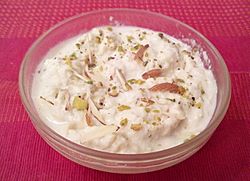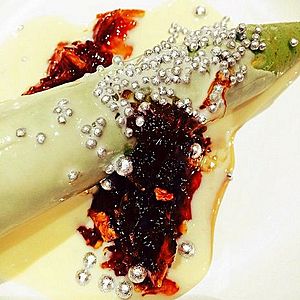Rabri facts for kids
 |
|
| Alternative names | Rabdi, Rabidi (in Odia) |
|---|---|
| Region or state | Indian subcontinent |
| Associated national cuisine | India, Pakistan, Bangladesh |
| Main ingredients | Milk and Pearl Millet Flour |
Rabri (IAST: Rabaḍī) (Urdu: ربڑی) is a delicious sweet dish. It comes from the Indian subcontinent. People make Rabri by boiling milk slowly for a long time. This makes the milk thick and changes its color to off-white or light yellow.
To make it taste even better, people add jaggery (a type of unrefined sugar), spices, and nuts. Rabri is usually served cold as a dessert. It is also a key ingredient in other sweet treats. Some examples are rasabali, chhena kheeri, and khira sagara. A similar dish is called Basundi.
History of Rabri
Rabri has been enjoyed for a very long time. An old text called Chandimangala mentions rabdi in the early 1400s. This shows that people were making and eating this sweet milk dish centuries ago.
In 1965, Rabri was temporarily banned in Kolkata, India. This happened during a time when the economy was struggling. The ban was put in place because Rabri uses a lot of milk. However, many sweet shops disagreed with the ban. They filed lawsuits, and the Calcutta High Court quickly overturned the ban within the same year.
How Rabri is Made
Making Rabri is a slow and careful process. It starts by heating sweetened milk in a large, open cooking pot. This pot is often called a kadhai.
As the milk heats, a layer of cream forms on its surface. This cream layer is carefully taken off and set aside. The cooking process continues, and more cream layers form. Each new layer is also removed and saved. This goes on until almost all the milk has been used up. The collected cream layers are then mixed back into the thickened milk to create the final Rabri.
See also
 In Spanish: Rabri para niños
In Spanish: Rabri para niños
 | John T. Biggers |
 | Thomas Blackshear |
 | Mark Bradford |
 | Beverly Buchanan |


